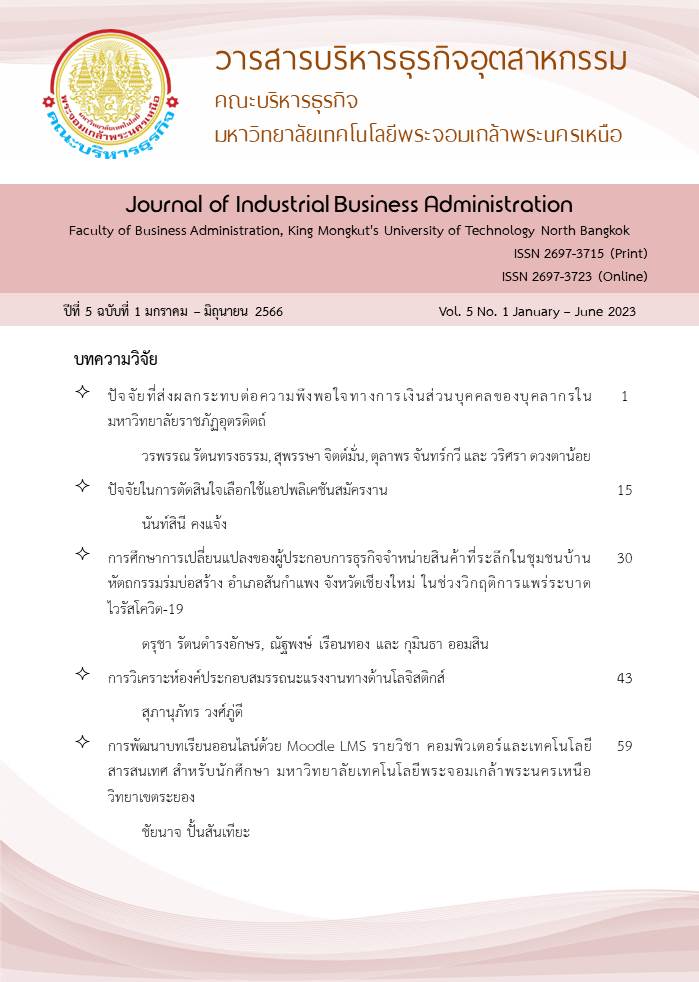Online Lesson Development with Moodle LMS Computer and Information Technology Courses for Students King Mongkut's University of Technology North Bangkok Rayong Campus
Abstract
From the situation spread of Covid 19 has caused by the Institutes of Education in Thailand have been closed. Therefore that can be effected for the students. The objectives of this study were 1) to develop online lessons for Computer and Information Technology Course by utilizing Moodle LMS, 2) to study the satisfaction of students who used online lessons provided in Computer and Information Technology Course based on Moodle LMS, and 3) to examine the efficiency of the online lessons in Computer and Information Technology Course when Moodle LMS was used. Five major stages: including analysis stage, design stage, development stage, application stage, and evaluation stage were conducted in order to obtain the final results. The sample consisted of 60 second-year students of King Mongkut's University of Technology North Bangkok, Rayong Campus, who took Computer and Information Technology course.
The results indicated that applying Moodle LMS to create and develop online course was convenient for instructors and students. Instructors were able to manage online teaching and design tests appropriately while students were able to learn the lessons and take quizzes throughout the specified period. The lessons could promote and enhance teaching and learning during the COVID-19 outbreak. The satisfaction level of students who used online lessons based on Moodle LMS was high, and the lesson efficiency E1/E2 was 80.45/81.08. Since the developed lesson was found to be effective, it was recommended to apply such method in teaching and learning.
References
McGriff, Steven J. (2000). Instructional System Design (ISD): Using the ADDIE Model. Instructional Design Models, 226(14), 1-2.
Ratanatherakul, A. (2010). Setting Up for E-Learning and Moodle System. Se-Education Publishing.
ชัยยงค์ พรหมวงศ์. (2556). การทดสอบประสิทธิภาพสื่อหรือชุดการสอน. วารสารศิลปากรศึกษาศาสตร์วิจัย, 5(1), 7-20.
ธนาภัสสร์ สนธิรักษ์, รังสรรค์ หล้าคําจา, วิมลพร ระเวงวัลย์, วันวิสาข์ พูลทอง และ เวนุกา ตาลาน. (2565). มิติรูปแบบการเรียนการสอนภาษาอังกฤษในยุควิถีชีวิตใหม่. วารสาร มจร มนุษยศาสตร์ปริทรรศน์, 8(1), 413-432
พระมหาเมธี จนฺทวํโส, พระครูวิโชติสิกขกิจ และ ดวงฤทัย เอี่ยมพล. (2565). ปัญหาการเรียนออนไลน์. วารสารวิชาการแสงอีสาน. 19(1), 61-68.
ภคมน ตะอูบ. (2559). การพัฒนาบทเรียน e-learning รายวิชานวัตกรรมและเทคโนโลยีสารสนเทศทางการศึกษา คณะครุศาสตร์. วารสารครุศาสตร์ คณะครุศาสตร์ มหาวิทยาลัยราชภัฏกำแพงเพชร, 1(2), 62-71.
รัฐนันท์ รถทอง. (2565). การเรียนรู้แบบไมโคร (Micro-Learning) และเทคโนโลยีการศึกษาในยุคดิจิทัล. วารสารบัณฑิตวิทยาลัยรำไพพรรณี, 15(1), 37-46.
สาโรช สอาดเอี่ยม. (2563). การพัฒนาบทเรียนออนไลน์ (e-Learning) เรื่องการสร้างบทเรียนคอมพิวเตอร์ช่วยสอนด้วยโปรแกรม Adobe Captivate สำหรับนักศึกษาระดับปริญญาตรีมหาวิทยาลัยราชภัฏเชียงใหม่. วารสารศึกษาศาสตร์ปริทัศน์, 33(2), 11-19.
Downloads
Published
How to Cite
Issue
Section
License
Copyright (c) 2023 Journal of Industrial Business Administration

This work is licensed under a Creative Commons Attribution-NonCommercial-NoDerivatives 4.0 International License.



